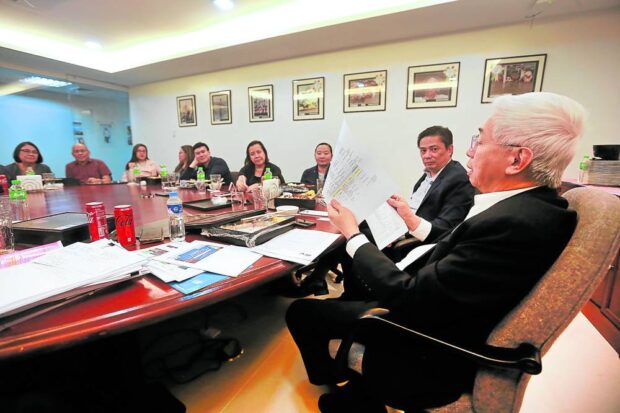Trade Secretary Alfredo Pascual seems to have his work cut out for him, between taking a lead role in expanding the country’s trade network and investment prospects to helping ensure that government policies are conducive to do business, down to upholding and protecting consumer rights.
The 75-year-old government official, who has more than five decades of combined experience in the corporate world and the academe, has high aspirations for the Philippines.
“We are very bullish and optimistic about what we intend to do this year and beyond,” Pascual tells the Inquirer in a roundtable interview.

BRIGHT PROSPECTS Trade Secretary Alfredo Pascual talks about the latest developments in the investment scene during a roundtable discussion with the Inquirer business section at the Inquirer office in Makati City. —EUGENE ARANETA
The trade chief puts emphasis on the significance of President Marcos’ many overseas trips to bring sizable investments to the Philippines, which now total around $73 billion counting all 148 projects in various stages.
READ: Marcos’ overseas visits help boost FDI inflows, says trade chief
“People expect that when you come back, the investments will happen. But that’s not the way it works,” he says, explaining the usual gestation period for these economic projects to materialize.
“It takes time,” he says, noting how this is especially the case for renewable energy projects.
Pascual says that offshore wind facilities, for instance, could take several years to materialize, counting the length of time needed for environmental impact evaluation, registration and processing of business permits, among others.
But despite this long process, the government is implementing a program called the “green lane” for strategic investments, which, as its name suggests, helps fast-track investments that are deemed essential.
According to government records, 42 projects worth about P1.3 trillion, mostly in the renewable energy sector, have been approved under this program
Free trade deals
Pascual says his department is also lining up prospects to increase the number of free trade agreements (FTA) with other countries, noting that the Philippines is behind most Asian peers when it comes to such trade pacts.
He says that they are targeting some countries in the African continent, particularly South Africa, Nigeria and Kenya. These are the African states that fare well in terms of economic development, Pascual says. They are now in the process of studying if there are areas where there can be complementarity.
READ: PH works on FTAs with African countries
Today, the Philippines has signed three bilateral FTAs: the Philippines-South Korea FTA signed in 2023, the Philippines-Japan Economic Partnership Agreement in 2006 and the European Free Trade Association in 2016.
It is also working on a new FTA with the United Arab Emirates through the Comprehensive Economic Partnership Agreement, with the formal discussions slated to begin within the first quarter of this year.
The Philippines also began the scoping discussions for an FTA with the European Union (EU) last year, with start of the formal negotiations also set to be announced early this year.
Pascual says that signing FTAs with more countries will also hopefully improve the local export sector, which is struggling to catch up with the $143.4-billion targeted receipts under the updated Philippine Export Development Plan.
The trade chief’s experience in the export industry dates back to the time of the late President Ferdinand Marcos Sr. in the 1970s, a time when he was tasked with drafting the charter for the Bataan Export Processing Zone, one of the first special economic zones in the Philippines.
“It was a colorful experience, as I remember that the President had wanted to finish the bill and it was already approaching Christmas, so it needed to be finished before Congress goes into recess,” said Pascual. While everybody else was partying for the holidays, he recalls that he had to finish the document.
Consumer protection
On consumer rights protection, Pascual says that many initiatives are in the works, but he highlights efforts to quash piracy and counterfeiting.
“We have Task Force Kalasag that will do enforcement in any part of the Philippines for consumer protection,” the trade chief says, noting that their department has also been given a P41- million budget to go after counterfeiters
“You don’t need to go after 100 percent (of these counterfeiters). If you make an example of a few, then that will make these people more cautious already.”
The 16-hectare shopping Greenhills Shopping Center complex in San Juan, Metro Manila was tagged as among the most notorious markets in the world for counterfeiting and piracy, along the likes of Chenghai District in China and the Heera Panna in Mumbai, India, based on the United States Trade Representative’s January report.
Today, the counterfeiting and piracy scene in the Philippines is a multibillion-peso market, based solely on the value of goods confiscated by government agents yearly.
According to records from the Intellectual Property Office of the Philippines, at least P23.03 billion worth of pirated goods had been seized by authorities from January to September last year, marking a two-fold increase in the value of contrabands confiscated by authorities during the comparable period in the previous year.
Pascual aims to finally put an end to the Greenhills counterfeiting problem.
“I can’t disclose, but I already have a plan in mind,” Pascual says.

